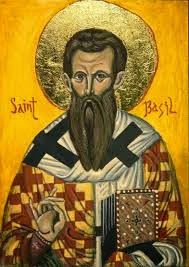One
day, for example, as the new Bishop of Caesarea, Basil strove against the
popular and State-sponsored Arian heresy.
In his exchange of words with the
Emperor’s prefect, Modestus, Basil spoke so boldly and bluntly that it left the
prefect stammering in astonishment. The prefect
had summoned Basil to a tribunal, and insisted that Basil fall in line with the
rest of the more pliant bishops and accept the Imperial interpretation of the
faith (i.e. Arianism).
“Everyone else
has yielded, and you alone refuse to accept the religion commanded by the
King!”
“It is not the
will of my King,” replied Basil, “I cannot worship anything that has been
created, since I myself am created by God.”
The prefect
examining Basil was incensed. “What do
you think of us?” he roared. “Are we
nothing?”
“You are a
prefect, but I shall not honour you more than I do God.”
“Do you know
what I can do to you? Don’t you fear my
power?” asked Modestus. “There are many
things I can do to you!”
“Name them.”
“I can
confiscate your possessions, banish you, torture you, put you to death!”
“Is that
all? None of these things trouble
me! You cannot confiscate my
possessions, for I have none.
Banishment, exile—what are these to me?
Everywhere on God’s earth I am at home.
Torture cannot touch me, for I have no longer a body to torture. As for death, it is welcome to me, for it
will bring me sooner into His blessed Presence.”
The prefect was
taken aback. “No one has ever addressed
me in such a manner until now.”
“No doubt.”
Basil replied. “Probably you have never met a proper bishop until now.”
Basil lived in
his whole life with that same indomitable courage. When he was first elected bishop of Caesarea,
he was ill and living on his nerves alone.
At the time of the election, his detractors said that he should not be
chosen as their bishop, since he was so weak and his health so precarious. His friend and supporter asked in return
whether they wanted a bishop or a gladiator.
As it turned out, they got both.
But Basil was
not a mere controversialist, a mere fighter.
He was also a scholar, an ascetic, a director of monastics, and the
creator of a charitable estate, encompassing a hospice for travellers, a
church, and a hospital, all with complete staff. He was also a man of self-sacrifice and
compassion, and he worked at his facility feeding the poor with his own
hands. “If you are reduced to your last
loaf of bread and a beggar appears at your door, then take that loaf and lift
our hands to heaven and say, ‘Lord, I have but this one loaf; hungers lies in
wait for me, but I revere our commandments more than all other things.’ If you say this, then the bread you gave in
that hour poverty will be changed for an abundant harvest.” Basil knew how to
love the poor. He was a proper bishop.
Now more than
ever we need proper bishops. The threat
of Arianism is long gone, but the deadly threat of worldliness and moral compromise
with the secular age remains. St. Basil
also remains, not just as our intercessor in heaven, but as an abiding example
for us who still labour on earth. Now
is the time for plain speaking and courageous confrontation. Now is the time to unite compassion for the
poor and ascetic holiness and daring defiance of the world’s standards in one
potent and powerful package. Now is the
time for St. Basil the Great.

No comments:
Post a Comment
Note: Only a member of this blog may post a comment.